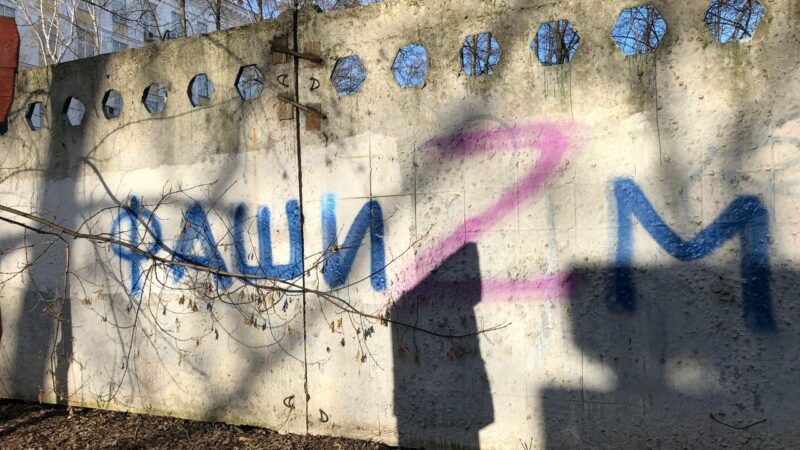
In this graffiti, the Z sign is used in the word Fascism. Photo: Archive/Used with permission
Since Russia started its invasion of Ukraine, the regime has quickly morphed from a “hybrid” authoritarianism into a totalitarian one. Independent Russian and Western media and social networking sites such as Meta, Twitter, and some others were blocked in order to promote “unified” support towards the war and Russian dictator Vladimir Putin. Throughout the country, a campaign was launched using Latin letter symbols Z and V to represent support for the war, which many observers say is a sign of increasing fascism. Russia's use of the Z and V symbols has been prominent, with the “V” representing “victory” in Putin's military operation. The character Z is not found in the Russian or Cyrillic alphabets, but is adapted from the Latin alphabet to mirror the pronunciation of the Russian word “за,” which means “for.” In the context of the war, it means “for the country.”
It is now illegal in Russia to call the war a “war” or protest it in any way. Violators can face up to 15 years in jail. According to the Russian government Lexus, what is happening is a “military operation.” Even people who go out on the streets with empty hands (pretending they hold a poster) have been detained. It is also prohibited to write anything anti-war in public spaces and on social media.
However, a lot of people in Russia continue to defy the authorities. Apart from individual protests when people oppose knowing in advance they would be detained, other forms of public dissent have emerged. People draw graffiti, leave objects on the streets, and find other ways to show their opposition under the constant threat of punishment.
The rare independent sources, for instance, student journal DOXA and the Telegram channel of journalist Roman Super, publish collections of protest photos every day showing readers that within Russian society there is more than the “unified” around the lies of propaganda.
Global Voices, with the permission of the authors, is publishing a selection of photos of everyday forms of protesting from around the country.

Photos of Putin, the minister of defense Shoigu, the head of Senate Matvienko and other members of Putin’s close circle. It can be read: “Don’t you dare drag Russia into your own grave.” Photo: Archive/Used with permission

A fake grave in one of Russian cities, the sign says “war is evil.” Photo: Archive/Used with permission

The sign says “Google Bucha” (a town where Russian army committed numerous war crimes during its occupation of this Ukrainian territory). Photo: Archive/Used with permission

The sign says “Do you remember you had plans for the future? No to war.” Photo: Archive/Used with permission

Grafiti equating the Z sign with a swastika. Photo: Archive/Used with permission

A wooden cross with blood on it saying Bucha 2022. Photo: Archive/Used with permission

Resembling an ordinary announcement about “fixing a roof,” this sign says: “Special operation is a war. President is crazy and no one wants to object to him.” Photo: Archive/Used with permission

The installation of a baby bodysuit states the date of death of a three-month-old girl, her mother, and her grandmother during the bombing of Odesa, Ukraine, by the Russian military. Photo: Archive/Used with permission

The sign says: “We have to STOP!” Photo: Archive/Used with permission

The sign says: “How far will you go in a mobile crematorium?” Photo: Archive/Used with permission

A sign saying “Make art. Not war” in the colors of Ukrainian flag. Photo: Archive/Used with permission

“What happened to Russia? – It sank” (a reference to Putin’s words about the catastrophe with Kursk submarine in 2004). Photo: Archive/Used with permission







